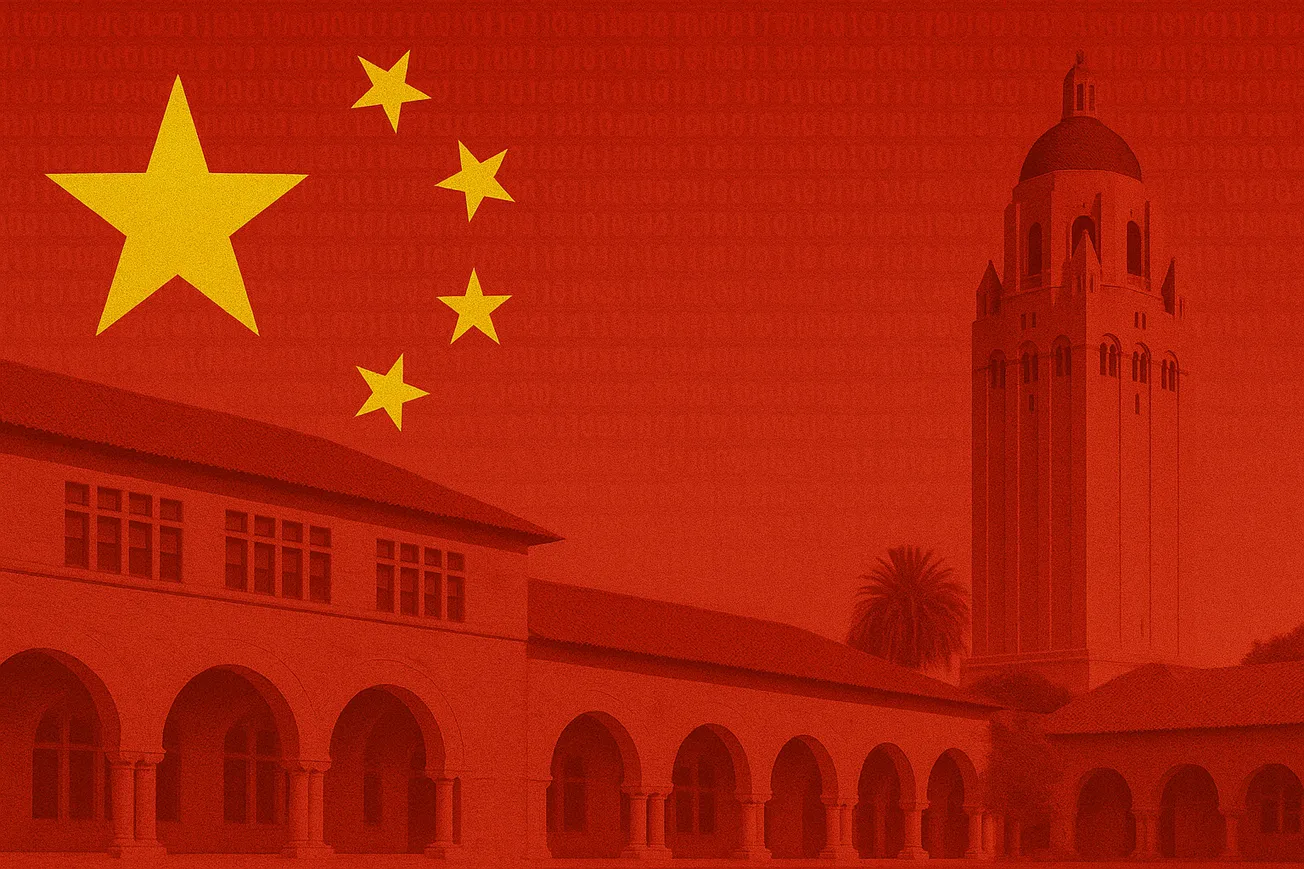Table of Contents
The Department of Computer Science is the crown jewel of Stanford. It minted trillions in Silicon Valley wealth, engineered large parts of the internet, and continues to be a powerhouse for the tech industry and American capitalism. It’s also the largest undergraduate department. But today, Stanford CS has fallen into woke insanity. For anyone who thought that a scientific discipline like CS was immune from the new racial pathologies, buckle up — the department’s recent meltdown is one for the ages.
On Sunday December 5th, CS students and faculty received an email from Dept. Chair Prof. John Mitchell and the Director of Diversity, Equity, and Inclusion (DEI) Breauna Spencer. The email was sent in response to two criminal verdicts delivered in November: the acquittal of Kyle Rittenhouse and the convictions of the three killers of Ahmaud Arbery. The email reads, in part:
On Friday, November 19th, a jury found Kyle Rittenhouse not guilty on all charges. It was not disputed that Rittenhouse brought a firearm to a Black Lives Matter protest in Kenosha, Wisconsin, killed Anthony Huber and Joseph Rosenbaum, and wounded Gaige Grosskreutz. As a department, we bemoan the loss of life. We are deeply saddened and disappointed by these events and acknowledge the pain and suffering they have caused many members of the community.
On Wednesday, November 24th, Travis McMichael, Gregory McMichael, and William Bryan were convicted on nine counts, including malice murder, felony murder, aggravated assault, false imprisonment, and criminal attempt for shooting and killing Ahmaud Arbery. Arbery’s case reflects a longstanding legacy of racial injustice. We offer our heartfelt condolences to Arbery’s family.
We condemn the violence, trauma, and suffering that the Black community has both historically and contemporarily endured. The pervasiveness of anti-Black racism reaffirms our department’s mission to create an equitable, diverse, and inclusive community that centers, affirms, and uplifts everyone and prioritizes an enduring sense of belonging and community for all.
For those personally affected by these events, the Stanford CS Department takes your well-being seriously. We understand that recent and ongoing affronts to the principle of racial equality or the Black Lives Matter Social Movement continue to be distressing, burdensome, and mentally and physically exhausting...
The Rittenhouse and Arbery sequences of events remind us of the work we must continue to do to eradicate anti-Blackness and systemic racism in our society. As Martin Luther King Jr. stated in his “I Have a Dream Speech” on August 28th, 1963, “we refuse to believe that the bank of justice is bankrupt.” Therefore, we call for accountability and powerful change. We fiercely and unapologetically ask that each person within our department take a stance against racism and other forms of oppression impacting marginalized communities and that we all educate ourselves on how to become anti-racists. Ibram Kendi writes that “to be antiracist is a radical choice in the face of history, requiring a radical reorientation of our consciousness.”
This simply makes no sense. Kyle Rittenhouse shot three white men at a riot in self-defense; all three had attacked him (one even pointed a gun!) and the jury found him not guilty. By contrast, the three white men in Georgia chased and killed an unarmed black man who was jogging, and the jury found them each guilty of murder. Kyle Rittenhouse had a legal right to self-defense when he was attacked and Ahmaud Arbery had a right to not be pursued and gunned down. But the CS department decided to link the cases together to construct a false racial narrative, unable to process the reality that our justice system did the right thing in both cases.
At the conclusion of the email, Mitchell and Spencer give students a “resource toolkit” to promote “continual learning” - not in computer science, obviously, but in anti-racism. The toolkit (PDF linked here) includes classics from black authors of the 19th and 20th centuries like W.E.B. DuBois, James Baldwin, and Maya Angelou. It unfortunately also includes modern-day race hustlers like Ibram X. Kendi (born Ibram Henry Rodgers), who advocates for an all-powerful “Department of Anti-Racism” within the federal government. The document even includes Robin DiAngelo, a white woman who has made millions from bestsellers like White Fragility.
But the most interesting (and revealing) “anti-racist” book recommendation is ASSATA: An Autobiography, written in 1988 by Joanne Deborah Chesimard, more commonly known as Assata Shakur. A member of the Black Liberation Army, a group that carried out numerous bombings, killings, and prison breaks in the US, Shakur is a convicted terrorist who was sentenced to life in prison in 1977 for the murder of a New Jersey state trooper, along with seven other felonies. Shakur escaped prison in 1979 and fled to Cuba, where she has remained a fugitive from justice ever since. As a guest of the Castros, she wrote the book that Stanford CS is now recommending to students in order to “advance racial equity and justice.”
You may think that the autobiography of a domestic terrorist and international fugitive is a questionable choice for a such a list, but you’d be missing the fact that it is also an historic choice. You see, Assata Shakur has the distinction of being the first woman on the FBI’s most-wanted terrorist list, with a $2 million reward for her apprehension. Talk about breaking a glass ceiling!
So, in case you were confused: Kyle Rittenhouse, who was legally absolved of criminal guilt by a jury after defending himself, is bad. Assata Shakur, who was convicted of murdering a police officer, escaped prison, and fled to Cuba, is good. Stanford CS “bemoans the loss of life” when two rioters are killed, one a child rapist and the other a domestic abuser. But Stanford CS does not bemoan the loss of NJ State Trooper Werner Foerster; in fact, they promote his murderer’s book. Got it?
It’s worth noting this is not the first time a Stanford administrator has positively referenced Shakur. In 2020, Dean of Students Mona Hicks quoted a “loving refrain from Assata Shakur” during the wave of BLM protests that began after the murder of George Floyd. The “refrain” includes the words: “we have nothing to lose but our chains.” One wonders whether Shakur thought of that before or after breaking out of New York state prison…
All of this leaves us with one big question: how on earth did we get to this point?
Surely Professor Mitchell, a pioneer in programming language theory and network security, doesn’t actually admire Assata Shakur; he probably has no idea who she is. Professor Mitchell probably also didn’t think that his job as department chair would involve disseminating propaganda to increase racial division among students. But he’s doing just that, all in the name of DEI. Why? The short answer is that the academic departments have been infiltrated by administrators like Ms. Spencer, who are professionally incentivized to maximize racial hysteria.
We’re calling on Stanford CS alumni to withhold their support from this department until we get an explanation as to why its leaders are behaving so inappropriately. Really, we deserve to know why the CS department is commenting on these matters at all. But while the department is offering its opinions on the news of the day, we have some clarifying questions. We’ll start with two obvious ones: Does the CS department support or oppose the fugitive terrorist Assata Shakur? What about the right to a trial by jury?
This debacle should serve as a warning to professors and departmental leaders everywhere, but especially in the sciences and engineering: DEI is poison, and if you let it take hold in your department, prepare to be taken for a ride. Today you’ll be promoting fuzzy concepts like “inclusion” and tomorrow what you'll be including are terrorist memoirs on departmental reading lists. Don’t say we didn’t warn you.
Make sure to subscribe to the Review so you never miss an article, and follow us on Twitter! If you want to support independent student journalism at Stanford, consider supporting the Review by donating.









